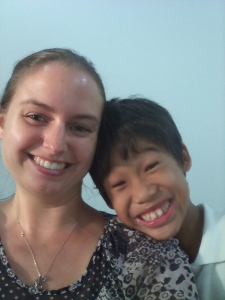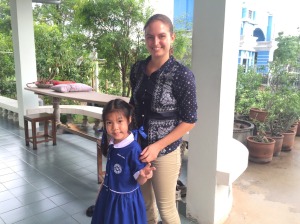It’s much thinner than I ever imagined it would be. I didn’t discover this in my classrooms. At my school, my students speak so little English that I have enough trouble teaching them, much less parenting them. No, I discovered this in my tutoring lessons. Of course teaching, in general, requires that you make an emotional investment in each and every one of your students, and a good teacher will inevitably come to care about the students and want to help them beyond the lessons they’re teaching. And perhaps I would experience that more in a classroom with students that speak my language, but here it has been very difficult for me to connect with my students beyond their English lessons. But my tutoring classes are an entirely different story. I am able to connect with those students in much more meaningful ways. For one, they all speak at least conversational English. Also, spending an hour one-on-one with a student gives you a lot of time to get to know them. In my tutoring classes, my students become complex human beings for me. They have dreams, desires, worries, strengths, and weaknesses. I’m given the opportunity to see many layers of their personality, which I don’t often get to do in my classrooms. I certainly recognize that every student I teach at my school has a complex life that has created a complex personality, but I’m not given access to that complexity in the ways I am during my tutoring classes. There are some students that I’ve connected with more than others, but with all of my tutoring students, I find that I’m more emotionally invested in them than I am with my students at my school simply because of the closeness we’ve developed during our tutoring sessions. This closeness, while it tends to help the atmosphere of the lessons overall as they become more comfortable with me as their teacher, sometimes adds a layer of complication to our relationship.
In addition to two adults, a high school student, and a kindergarten student, I tutor three primary school students. They’re all 9 or 10 years old, and they’re amazing kids. They all have very advanced English skills, and I mostly work on grammar and speaking with them. This is the age level that I find it most difficult to separate being a teacher and being a parent. In Thailand, children are expected to listen to and respect their parents to a degree that many in the US wouldn’t be able to comprehend. But that respect is not expected to be returned to the children. Parents don’t have to listen to the children, and they often don’t. This means the children usually won’t voice their problems or worries to their parents. Then they meet me. I’m a foreigner. I’m different from the Thais. I grew up with a mom who always took time to listen to me and offer advice when I needed it, and I offer the same treatment to my students. They learn very quickly that Teacher Jen is someone who will listen to their problems and try to sympathize and won’t judge them if they’ve done something ‘wrong.’ It’s different from what they normally encounter, and they take advantage of it.
Let me tell you about Meena. Meena is my newest student. She’s ten years old and speaks almost fluent English. I met her about a month ago when I started tutoring her at a local mall. During our first lesson, I discovered that she was a very shy but very bright student. I met her brother, who is almost done with school and who had traveled to Portugal last year to study abroad. It became clear within a few minutes that Meena was living in her brother’s shadow. During the first few minutes of meeting Meena, her brother, and her dad, I tried to ask Meena some questions, which were almost always answered by her brother. It’s not that she wasn’t capable of answering. It’s that her brother wanted to be the one to talk, which stopped Meena from doing so. I was glad when I was finally left alone with her and was able to start her lesson. But it only got more complicated from there. During one of the speaking activities, she started telling me about the girls at school who had bullied her last year, and she was clearly scarred by it. I saw that her self-confidence was incredibly low. It seemed that no one had listened to her and that she wasn’t receiving much support from her family. And she wanted to talk. I was supposed to be teaching her English, but I saw how desperate she was for someone to hear her and I let her tell me about it. We spent at least half of the class in that way. The next class wasn’t much different, except that I felt even more pressure than during the first lesson. She needed praise, she needed someone to make her laugh, and she needed someone to listen. I wanted to do all of it for her and still be an effective tutor. I poured my entire heart and what was left of my energy into the lesson, and when it was done, I had to drag myself out of the mall from exhaustion. As I was leaving, I recognized that I had, somehow, taken on the role of both parent and tutor for Meena. She had even dubbed me her ‘counselor’ during the lesson—a role I wasn’t entirely comfortable with for obvious reasons. I was happy I was helping her, and I loved that she was enjoying her lessons with me, but I recognized that things couldn’t continue in the same way the next week. There had to be a line, and I had to be the one to draw it. So the next week, I let Meena interject occasionally with personal topics, but I tried to steer her back to the lesson fairly quickly each time. And it went pretty well. She still got a little talking time in, and I still got to teach her English. She had fun, and the lesson wasn’t nearly as draining for me. She’s got a pretty negative attitude, toward both herself and the world around her, she often lingers on subjects such as revenge and death, and she often mistakes lying with joking. She has her problems, but when I see her laugh during our lessons, I see that she’s still young and that there’s still time for her to regain her confidence and a more positive outlook. I won’t be in Thailand for much longer, but while I’m here I hope I can help her overcome some of the obstacles she’s facing in her life, and in the process I’m sure she’ll help me learn more about what it means to be a good teacher, as all my students are doing.



Jen, a person once told me, “it only takes one person to make the difference in the life of a child!”
LikeLike
I think that’s definitely true, and I hope I can be that person many times in my life. 🙂
LikeLike